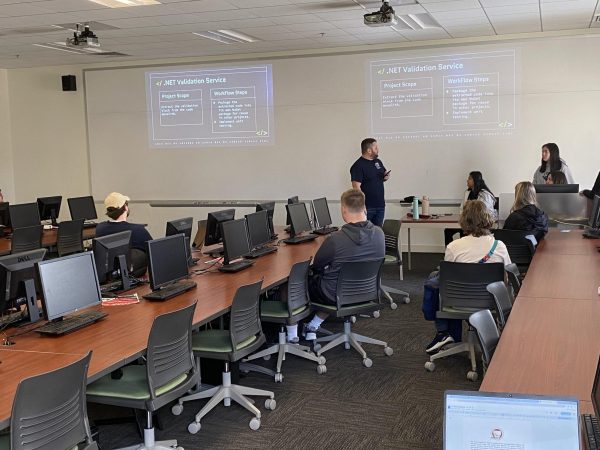SGA implements first free menstrual product dispenser on campus
November 8, 2022
The Student Government Association began the process of placing free menstrual product dispensers in women’s restrooms across campus in late October. The first dispenser was placed on the first floor of the Health Professions Center and is currently the only dispenser on campus.
View this post on Instagram
Taegan Garner, SGA president, said there will be dispensers in the Liberal Arts Center, University Center East, David L. Rice Library and the Pott College of Science, Engineering and Education.
Garner said she is not sure when the other dispensers will be placed on campus, but a work order has been placed for them.
“In my opinion, all schools should have these,” Garner said. “There’s no reason that anyone should be paying for tampons in schools.You should not have to go to the nurse’s office and explain your situation to get a tampon.”
She said there is an agreement in place with the university for the free menstrual products on campus. She said while SGA funded the products, the university will continue to refill them as needed.
Garner said she does not know how often the dispensers will be refilled because they are unsure how long it will take for the dispensers to run out.
SGA has been working to implement free period products since May 2021 when the 2021-2022 SGA President, Anna Ardelean, proposed the idea during the 2021 spring election.
Garner said the problem with the current menstrual product dispensers is not that they cost money, but they are not accessible.
“If it’s an emergency situation, who wants to go find a quarter?,” Garner said.
Ashley Arauz, junior biology major, said she has had issues with getting menstrual products that were not free because she did not have change. She said she had to find her friend and ask for change so she could get the product.
“She helped me out in that, but imagine trying to search for one, right? It will get even more stressful,” Arauz said.
Madeline Houston, former First Year Leadership Council Member, presented her research to the SGA General Assembly Feb.17, and the SGA voted to pass a letter of support to place free period products in women’s restrooms across campus. After the letter of support was sent, SGA began placing baskets with free products into women’s restrooms as a test run.
Garner said she spoke to SGA and Steve Bridges, vice president for finance and administration, after Houston’s research. Garner said SGA decided to fund the menstrual products to implement the dispensers on campus.
Garner said SGA purchased the dispensers and menstrual products through the Aunt Flow Program.
“There were two options,” Garner said. “We could just go with having baskets made and refilling them all the time, but the issue with that is it’s not a longevity plan, and we wanted to make sure this was something that really stuck with the university and it’s something we could keep doing.”
Garner said it was a long process to convince the university it was necessary and to justify the cost. She said SGA spent around $300 per dispenser on campus and a couple hundred dollars on the menstrual products.
“Really, in the grand scheme of things, that’s not a big investment,” Garner said.
She said one of the concerns during the planning process of implementing the dispenser was that students would take advantage of the free products.
“I think most women understand this is something we need,” Garner said. “Let’s not abuse it.”
Arauz said she does not think women will take advantage of the free menstrual products. She said people should not worry about the products being taken advantage of because she thinks students will only take what they need, especially during an emergency.
“I read somewhere that 1 in 4 students is experiencing period poverty, which is lack of access to period products,” said Imudunie Wijesuriya, junior economics major. “Periods are something that we cannot stop. It is uncontrollable.”
Wijesuriya said having free menstrual products on campus for students can help them feel more comfortable. She said she would like it if other companies and schools would provide free menstrual products.
“I don’t want to say you have to provide free menstrual products, but I can say it would be great if you guys could provide menstrual products for free,” she said.
Arauz said she was surprised when she heard free menstrual products would be offered on campus.
“When I saw that, I thought, ‘Well, this is great. These should be all over campus, whether it’s specific bathrooms or buildings,’” Arauz said.
“I feel happy about it,” said Ivys Quintana, sophomore English teaching major. “I thought that it was time that it happened on campus.”
Quintana said in one of her classes, she and her classmates discussed how there are places available that offer free condoms on campus, but it is difficult to find free menstrual products on campus.
“I think the only place you could get them, before they started putting them in the restrooms, was if you go to Archie’s Closet, and they give some menstrual products, but that’s it,” Quintana said. “Also, menstrual products are not available for everyone. Some people definitely don’t have the money to afford that every month.”
She said she first saw free menstrual products when she took a Spring Break trip to Atlanta.
“I was like, ‘Why is this not happening everywhere? Why do we have to pay for these?” Quintana said.
She said she thinks it is a good step for the campus to provide free menstrual products, but she thinks it should be advertised better so students know more about it and where to find it. She said she searched different buildings on campus and could not find the free menstrual product dispenser.
Several students think the next step to providing the free menstrual product dispenser is for people to talk more openly about menstruation.
“I think one of the reasons now we’re getting one is because we’re having discussions about it,” Quintana said.
Garner said in the past, people have not talked about women’s issues. She said the topic of free menstrual products is “something to address.”
This is something not that expensive, not in any way a complex thing, that we can just do a nice thing for students,” Garner said. “We can help students have a smoother college experience.”
















